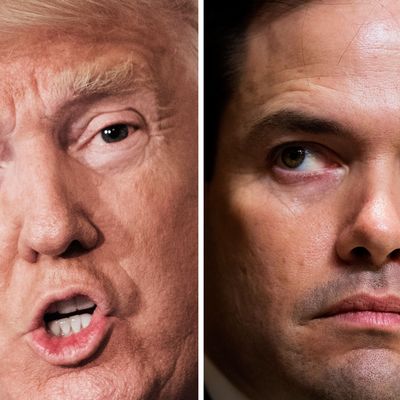
If you step back from all the chaos and erratic presidential behavior surrounding the sorta kinda deal Donald Trump seems to have cut with congressional Democratic leaders that encompasses a new DREAM Act and border security measures, it’s a very old tale.
Deals to legalize undocumented immigrants in exchange for more border security or other steps to tighten the immigration system were the essence of the interminable and ultimately futile stabs at “comprehensive immigration reform” that failed during the Bush and Obama administrations. In the end, the unwillingness of a significant segment of conservatives in Congress and around the country to accept “amnesty” killed these efforts. The question now is whether Dreamers are a sufficiently small and sympathetic class of beneficiaries to make a deal less toxic, particularly with Donald Trump, of all people, leading the way.
To some extent Trump is playing the same role in this drive for a miniature version of immigration reform that was performed by George W. Bush in 2007 and Marco Rubio in 2013 with respect to larger and more complicated initiatives. Rubio’s leadership of the so-called Gang of Eight (a bipartisan group of senators supporting comprehensive immigration reform) led to the same ignominious defeat in Congress that Bush experienced eight years earlier, and significantly handicapped his 2016 presidential campaign (even though Rubio spent many months backing away from his earlier positions on immigration). The main difference other than the scope of the bargain is that Trump’s predecessors pursued bipartisan initiatives through normal legislative channels, not a sudden oral agreement with leaders of the opposing party over Chinese food at the White House.
Lest we forget, Trump assailed “Little Marco” mercilessly on the 2016 campaign trail for his treacherous role in promoting “Obama’s amnesty” (in addition, of course. to mocking him for wearing heeled boots). But now Trump’s in the deal-making catbird seat.
To the extent that conservatives take the position long held by former White House Chief Strategist Stephen Bannon, the scope of the deal and even the quid pro quo don’t matter:
“[T]here’s no path to citizenship, no path to a green card and — no amnesty. Amnesty is non-negotiable,” Steve Bannon said to [Charlie] Rose in his first TV interview since departing from the Trump administration and returning to Breitbart News last month.
No wonder Bannon’s Breitbart News is greeting the reported deal with cries of “Amnesty Don.” And they aren’t alone:
Trump himself is trying to squirm out of the position he’s placed himself in by expressing confusion over the meaning of words like “amnesty” and “citizenship:”
This is, of course, the age-old argument that Trump supporters are accustomed to mocking: attaching conditions to a path to citizenship means it’s not really “amnesty.”
When Marco Rubio tried this dodge, he was barbecued for it, as this PolitiFact assessment noted:
Rubio opposed amnesty while running for Senate in 2010. He flatly said that he would oppose granting “blanket, legalization, amnesty” in an interview with a conservative blogger. In a CNN debate that year, he again opposed amnesty and linked it to a path to citizenship when he said that an “earned path to citizenship is basically code for amnesty” and that it would be unfair to “create an alternative pathway for individuals who entered illegally and knowingly did so.”
But in 2013, he was one of eight authors of a Senate bill that included a path to citizenship and declared that it was not amnesty.
Trump’s apparent flip-flop in the opposite direction is vastly more egregious. In the wake of the deal with Pelosi and Schumer, the Daily Caller quickly identified “Sixty-Nine Times Trump Attacked Amnesty.” Most notably, in his big immigration policy speech in Arizona last August, Trump not only denounced any approach other than enforcement of current laws as “amnesty,” but specifically used the a-word to describe DACA, the DREAMer-protecting action he is now endorsing in the form of legislation.
Sure, Trump as president is a lot more powerful than Rubio the U.S. Senator, and you can make the Nixon-to-China argument that only someone with Trump’s nativist background can pull off the kind of immigration deal that has eluded his predecessors. But George W. Bush was president as well, and was once beloved of his party’s conservative “base.” It’s odd Trump would test his supporters’ fidelity so directly and with so relatively little to gain from it. Little Marco must be very amused today to discover Donald Trump walking in his boots.






























